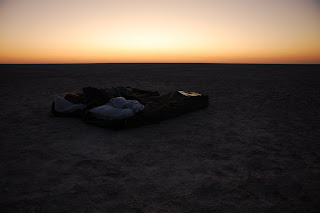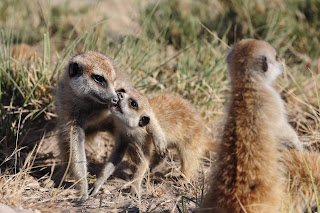We reached our next destination, Planet Baobab, a few km east of Gweta and after lunch settled in and checked out some of the surrounding baobab trees. Planet Baobab is kind of a quirky place, with a funky twist on traditional building styles. Our room was a round hut with the bathroom in a second round hut connected by an open air hallway.
 The thatch roof bar had chandeliers made with old beer bottles.
The thatch roof bar had chandeliers made with old beer bottles.
Baobabs are a strange tree found in small areas throughout Botswana. They have wide trunks to help store water, but are short and with stumpy branches to help preserve water.
 They also have shallow roots that spread out as much as 200 meters, but it's not totally clear to us if this is also for increased water gathering, or if it's because there's only a couple feet of soil around Gweta before reaching a hard rock layer.
They also have shallow roots that spread out as much as 200 meters, but it's not totally clear to us if this is also for increased water gathering, or if it's because there's only a couple feet of soil around Gweta before reaching a hard rock layer.That's all stuff we learned as we walked with our guide around the forest near Planet Baobab. Since there weren't too many animals about, he focused on the various local plants and their uses. We ended up next to a water hole for sunset, but other than a few birds, the only visitors were cows and horses while we had a sunset drink. Our guide also told us some of the geologic history of the area, how Botswana's three main rivers (Okavango, Linyanti, and Zambezi) had flowed south through Bostwana to the Limpopo several million years ago. Then a ridge was pushed up, blocking their flow and creating an enormous lake. Eventually, other ground movements diverted the flow of those rivers yet again and the lake dried up leaving several dry pans totalling 25,000 square km; the biggest single pan, the Ntwetwe, is being 6,000 square km.
The next morning we went for a village tour of Gweta. Gweta doesn't have the sights of, say, London or Washington, but it does have a 90-something year old former bushman and healer.
 He tried to tell us our fortune using some decorated wooden pieces, but didn't do too well. I guess his life experiences probably were too different from ours for his traditional methods to accurately reveal very much about us. After the village tour, we went to a small farm nearby for a traditional lunch. We started with a sample of some of the homemade alcohol. It's made from fermented sprouting sorghum seeds and is only about 3% alcohol. One of the women there seemed particularly enthusiastic about it and kept singing and dancing.
He tried to tell us our fortune using some decorated wooden pieces, but didn't do too well. I guess his life experiences probably were too different from ours for his traditional methods to accurately reveal very much about us. After the village tour, we went to a small farm nearby for a traditional lunch. We started with a sample of some of the homemade alcohol. It's made from fermented sprouting sorghum seeds and is only about 3% alcohol. One of the women there seemed particularly enthusiastic about it and kept singing and dancing. Lunch was mealie pap with several other dishes - beans and bean greens, beef, beef tripe, and mopani worms. Tom managed to eat one, but Katie's was in her mouth for about a millisecond before she spat it out.
Lunch was mealie pap with several other dishes - beans and bean greens, beef, beef tripe, and mopani worms. Tom managed to eat one, but Katie's was in her mouth for about a millisecond before she spat it out. Finally, dessert was a yogurt like drink with baobab seeds in it.
Finally, dessert was a yogurt like drink with baobab seeds in it.Later that afternoon, we took off through the maze of faint dirt roads south of Gweta. Forty km and and hour and a half later, we reached a livestock corral and huts where there were also several quadbikes. Our guide taught us how to make hats out of cloths,
 we each got on a quadbike, and headed out onto Ntwetwe Pan. Pretty soon we couldn't see anything around but the flat expanses, and an occasional grassy island. We stopped at a spot where there were stone age tools. After a bit more riding,
we each got on a quadbike, and headed out onto Ntwetwe Pan. Pretty soon we couldn't see anything around but the flat expanses, and an occasional grassy island. We stopped at a spot where there were stone age tools. After a bit more riding, in the distance we could see some objects on the pan. Closer, we could make out a truck, grill, table & chairs, and rollout mattresses. We would be sleeping in the middle of the pan.
in the distance we could see some objects on the pan. Closer, we could make out a truck, grill, table & chairs, and rollout mattresses. We would be sleeping in the middle of the pan. While dinner cooked, we watched the sun set over the edge of the pan. We were lucky with clear night and the stars came out in an unobstructed view all the way around.
While dinner cooked, we watched the sun set over the edge of the pan. We were lucky with clear night and the stars came out in an unobstructed view all the way around. (Side note about the weather: at this time of year, it should be almost cloudless here. But the whole time we've been in Botswana, we've had cloudy nights and mornings with clearing in the afternoon, and a return of the clouds either in the late afternoon or night. The night on the pan and one night in the Okavango Delta were exceptions. The locals think it's really weird.) Dinner was a feast of grilled beef, potatoes, butternut squash, and even beer bread cooked with the hot coals. After sharing stories with our guide around the campfire, we settled into our salt pan beds for some stargazing before falling asleep. We saw several shooting stars, including some which we could even see breaking up.
(Side note about the weather: at this time of year, it should be almost cloudless here. But the whole time we've been in Botswana, we've had cloudy nights and mornings with clearing in the afternoon, and a return of the clouds either in the late afternoon or night. The night on the pan and one night in the Okavango Delta were exceptions. The locals think it's really weird.) Dinner was a feast of grilled beef, potatoes, butternut squash, and even beer bread cooked with the hot coals. After sharing stories with our guide around the campfire, we settled into our salt pan beds for some stargazing before falling asleep. We saw several shooting stars, including some which we could even see breaking up.We woke up to the sun rising on the edge of the pan. After a quick snack, we took off on the quadbikes to the edge of the pan, where we would find meerkats in the grass. When we got there, they hadn't woken up yet, but after a few minutes, one was brave enough to poke its head out of the burrow. Then one by one the rest followed.
 Once our guide thought they were feeling sufficiently safe, he said we could approach them. Katie sat on the mound of dirt at the entrance to their burrow, and after running for cover, they got used to her being there and came out, standing right next to her.
Once our guide thought they were feeling sufficiently safe, he said we could approach them. Katie sat on the mound of dirt at the entrance to their burrow, and after running for cover, they got used to her being there and came out, standing right next to her. Then it was my turn. After I'd sat there for a couple minutes, I thought, if these guys will let me so close, why not get my camera? So, Katie and I brought the cameras over, and started taking pictures right next to them, as they went about their usual meerkat antics.
Then it was my turn. After I'd sat there for a couple minutes, I thought, if these guys will let me so close, why not get my camera? So, Katie and I brought the cameras over, and started taking pictures right next to them, as they went about their usual meerkat antics.

But we knew we had some distance to cover in the afternoon, so we left the entertainment of the meerkats and returned to Planet Baobab to pack up. We walked to the road not knowing when a bus would come by. Maybe they were every hour, maybe not. We had just put sunblock on, ready for a long wait on the side of the road when a bus came by. I signaled for it to stop, but it barrelled by - we had been told they would stop there! Down the road it looked like it wass lowing down - yes, it had stopped! We ran to catch it while it reversed. It took us to Nata, about an hour away, where we had to catch a different but to Kasane, in northern Botswana. Again, we had conflicting information on the Nata-Kasane bus. Maybe it was hourly, maybe there was one at 2pm, which was exactly when we got there. The two buses at the gas/bus station were going to Maun (the direction we had come from) and Francistown (the direction of the bus we had just gotten off), but supposedly the bus to Kasane was coming soon. Some locals were waiting for the bus to Kasane as well, but they were as uninformed as we were, and had been waiting all day for a bus which hadn't come yet. Well, it seemed better that it hadn't come yet than already come, but a rumor was circulating that there would be no bus today. Then a few events happened all at once: a couple of French backpackers trying to get to Kasane joined us, the locals started tiring of waiting and believing the no bus rumor, and a flatbed truck was about to leave for Kasane. So, with the locals and French backpackers ready to hop on the back of the truck, we decided to join them. We covered the 300+ km between Nata and Kasane with about 18 other people in the back of this truck. On the way we saw several elephants near the road. And we made it safely, if somewhat uncomfortably, to Kasane, where we will be spending our last two nights in Botswana.
I notice you are no longer praising the food as you did before? Could it be the mopani work or mealie pap (what is THAT?)? Sounds like quite an adventure though. Keep up the interesting postings, m
ReplyDelete"Enfants! Fait attention aux baobabs!" A. de Saint-Exupery. Just a thought. BV Mom
ReplyDelete